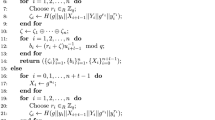Abstract
A publicly verifiable secret sharing scheme is a secret sharing scheme in which everyone, not only the shareholders, can verify that the secret shares are correctly distributed. We present new such schemes and use them to share discrete logarithms and integer factorizations. The shareholders will be able to recover their shares quickly (fast recovery) or after a predetermined amount of computations (delayed recovery) to prevent the recovery of all the secrets by un-trustworthy shareholders (e.g. if these schemes are used for escrowing secret keys). The main contribution of this paper is that all the schemes we present need much less computations and communicated bits than previous ones [BGo, FOk, Mao, Sta, YYu]. By the way, we introduce in this paper several tools which are of independent interest: a proof of equality of two discrete logarithms modulo two different numbers, an efficient proof of equality of a discrete logarithm and a third root, and an efficient proof of knowledge of the factorization of any composite number n, where it is not necessary to prove previously that n is the product of two prime factors.
Access this chapter
Tax calculation will be finalised at checkout
Purchases are for personal use only
Preview
Unable to display preview. Download preview PDF.
Similar content being viewed by others
References
Bellare, M., Goldwasser, S.: Verifiable Partial Key Escrow. In: Proceedings of the Fourth Annual Conference on Computer and Communications Security, pp. 78–91 (1997)
Bao, F.: An Efficient Verifiable Encryption Scheme for Encryption of Discrete Logarithms. To be published in the proceedings of CARDIS 1998 (1998)
Bellare, M., Rogaway, P.: Random Oracles are Practical: a Paradigm for Designing Efficient Protocols. In: Proceedings of the First Annual Conference and Communications Security, pp. 62–73 (1993)
Chaum, D., Evertse, J.-H., van de Graaf, J.: An Improved Protocol for Demonstrating Possesion of Discrete Logarithm and Some Generalizations. In: Price, W.L., Chaum, D. (eds.) EUROCRYPT 1987. LNCS, vol. 304, pp. 127–141. Springer, Heidelberg (1988)
Chan, A., Frankel, Y., Tsiounis, Y.: Easy Come - Easy Go Divisible Cash. In: Nyberg, K. (ed.) EUROCRYPT 1998. LNCS, vol. 1403, pp. 561–575. Springer, Heidelberg (1998)
Chor, B., Goldwasser, S., Micali, S., Awerbuch, B.: Verifiable Secret Sharing and Achieving Simultaneity in the Presence of Faults. In: Proceedings of FOCS, pp. 383–395 (1985)
Chaum, D., Pedersen, T.P.: Wallet Databases with Observers. In: Brickell, E.F. (ed.) CRYPTO 1992. LNCS, vol. 740, pp. 89–105. Springer, Heidelberg (1993)
Charnes, C., Pieprzyk, J., Safavi-Naini, R.: Conditionally Secure Secret Sharing Scheme with Disenrolment Capability. In: Second ACM Conference on Computer and Communication Security, pp. 89–95 (1994)
Feldman, P.: A Practical Scheme for Non-Interactive Verifiable Secret Sharing. In: Proceedings of the 28th IEEE Symposium on FOCS, pp. 427–437 (1987)
Fujisaki, E., Okamoto, T.: A Practical and Provably Secure Scheme for Publicly Verifiable Secret Sharing and Its Applications. In: Nyberg, K. (ed.) EUROCRYPT 1998. LNCS, vol. 1403, pp. 32–46. Springer, Heidelberg (1998)
Fiat, A., Shamir, A.: How to Prove Yourself: Practical Solutions to Identification and Signature Problems. In: Odlyzko, A.M. (ed.) CRYPTO 1986. LNCS, vol. 263, pp. 186–194. Springer, Heidelberg (1987)
Girault, M.: Self-Certified Public Keys. In: Davies, D.W. (ed.) EUROCRYPT 1991. LNCS, vol. 547, pp. 490–497. Springer, Heidelberg (1991)
van de Graaf, J., Peralta, R.: A Simple and Secure Way to Show the Validity of Your Public Key. In: Pomerance, C. (ed.) CRYPTO 1987. LNCS, vol. 293, pp. 128–134. Springer, Heidelberg (1988)
Mao, W.: Guaranteed Correct Sharing of Integer Factorization with Off-line Shareholders. In: Proceedings of Public Key Cryptography 1998, pp. 27–42 (1998)
Micali, S.: Fair Public-Key Cryptosystems. In: Brickell, E.F. (ed.) CRYPTO 1992. LNCS, vol. 740, pp. 113–138. Springer, Heidelberg (1993)
Miller, G.: Riemann’s hypothesis and Tests for Primality. Journal of Computer and System Sciences (13), 300–317 (1976)
Maurer, U., Yacobi, Y.: Non-Interactive Public-Key Cryptography. In: Davies, D.W. (ed.) EUROCRYPT 1991. LNCS, vol. 547, pp. 498–507. Springer, Heidelberg (1991)
Pohlig, S.C., Hellman, M.: An Improved Algorithm for Computing Logarithms over GF(p) and its Cryptographic Significance. Proceedings of IEEE Transactions on Information Theory IT-24, 106–110 (1978)
Pollard, J.M.: Theorems on Factorization and Primality Testing. In: Proceedings of Cambridge Philos. Society, vol. 76, pp. 521–528 (1974)
Poupard, G., Stern, J.: Security Analysis of a Practical on the fly Authentication and Signature Generation. In: Nyberg, K. (ed.) EUROCRYPT 1998. LNCS, vol. 1403, pp. 422–436. Springer, Heidelberg (1998)
Rivest, R., Shamir, A., Wagner, D.: Time-Lock Puzzles and Time- Release Crypto (to appear), this paper is available http://theory.lcs.mit.edu/~rivest/publications.html
Shamir, A.: How to Share a Secret. CACM 22(11), 612–613 (1979)
Shanks, D.: Five Number-Theoric Algorithm. In: Proceedings of the 2nd Manitoba conference on numerical mathematics, pp. 51–70 (1972)
Stadler, M.: Publicly Verifiable Secret Sharing. In: Maurer, U.M. (ed.) EUROCRYPT 1996. LNCS, vol. 1070, pp. 190–199. Springer, Heidelberg (1996)
Young, A., Yung, M.: Auto-Recoverable Auto-Certifiable Cryptosystems. In: Nyberg, K. (ed.) EUROCRYPT 1998. LNCS, vol. 1403, pp. 17–31. Springer, Heidelberg (1998)
Author information
Authors and Affiliations
Editor information
Editors and Affiliations
Rights and permissions
Copyright information
© 1999 Springer-Verlag Berlin Heidelberg
About this paper
Cite this paper
Boudot, F., Traoré, J. (1999). Efficient Publicly Verifiable Secret Sharing Schemes with Fast or Delayed Recovery. In: Varadharajan, V., Mu, Y. (eds) Information and Communication Security. ICICS 1999. Lecture Notes in Computer Science, vol 1726. Springer, Berlin, Heidelberg. https://doi.org/10.1007/978-3-540-47942-0_8
Download citation
DOI: https://doi.org/10.1007/978-3-540-47942-0_8
Publisher Name: Springer, Berlin, Heidelberg
Print ISBN: 978-3-540-66682-0
Online ISBN: 978-3-540-47942-0
eBook Packages: Springer Book Archive




